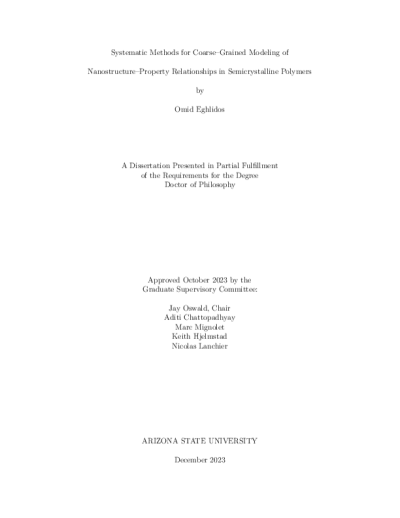
Description
It is well–established that physical phenomena occurring at the macroscale are the result of underlying molecular mechanisms that occur at the nanoscale. Understanding these mechanisms at the molecular level allows the development of semicrystalline polymers with tailored properties for different applications. Molecular Dynamics (MD) simulations offer significant insight into these mechanisms and their impact on various physical and mechanical properties. However, the temporostpatial limitations of all–atomistic (AA) MD simulations impede the investigation of phenomena with higher time– and length–scale. Coarse–grained (CG) MD simulations address the shortcomings of AAMD simulations by grouping atoms based on their chemical, structural, etc., aspects into larger particles, beads, and reducing the degrees offreedom of the atomistic system, allowing achievement of higher time– and length–scales. Among the approaches for generating CG models, the hybrid approach is capable of capturing the underlying mechanisms at the molecular level while replicating phenomena at temporospatial scales attainable by the CG model. In this dissertation, a novel hybrid method is developed for the systematic coarse–graining of semicrystalline polymers that uniquely blends the potential functions of both phases. The obtained blended potential not only faithfully reproduces the structural distributions of multiple phases simultaneously but also allows control over the dynamics of the obtained CG models employing a tunable parameter. Given that accelerated dynamics of the CG models hinder the investigation of phenomena in the crystal phase, such as α–α-relaxation, by utilizing the developed method, this phenomenon was successfully modeled for a semicrystalline polyethylene (PE) system with obtained values for the diffusion constant at room temperature and the activation energy in close agreement with experimental results. In a subsequent study, a family of potentials was developed for a sample semicrystalline polyethylene (PE) to investigate the impact of different potential functions on some physical properties, such as crystal diffusion and glass transition temperature, and their correlation with some mechanical properties
obtained from uniaxial deformation.
Details
Title
- Systematic Methods for Coarse–Grained Modeling of Nanostructure–Property Relationships in Semicrystalline Polymers
Contributors
- Eghlidos, Omid (Author)
- Oswald, Jay JJO (Thesis advisor)
- Chattopadhyay, Aditi (Committee member)
- Mignolet, Marc (Committee member)
- Hjelmstad, Keith (Committee member)
- Lanchier, Nicolas (Committee member)
- Arizona State University (Publisher)
Date Created
The date the item was original created (prior to any relationship with the ASU Digital Repositories.)
2023
Subjects
Resource Type
Collections this item is in
Note
- Partial requirement for: Ph.D., Arizona State University, 2023
- Field of study: Aerospace Engineering
